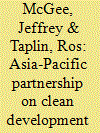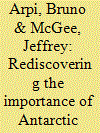| Srl | Item |
| 1 |
ID:
074353


|
|
|
|
|
| Publication |
2006.
|
| Summary/Abstract |
The Asia-Pacific Partnership on Clean Development and Climate (AP6) has been marketed as an innovative new approach to international climate change policy that is complementary to the existing Kyoto regime. It is important to closely examine these claims of complementarity, given the two nations that were central to the formation of the AP6, the United States and Australia, have both expressly repudiated the Kyoto process. The difficulty involved in this exercise is in separating political rhetoric regarding complementarity from the reality of how the AP6 will likely impact upon the effectiveness of the Kyoto regime. This article discusses the AP6 and the various claims as to complementarity with Kyoto made during its formation in July 2005 and inaugural meeting in January 2006. For the purpose of analyzing these claims of complementarity five key features of the content of the AP6 are identified for comparison with Kyoto. Stokke's theory of regime interplay is used to assess how each of the five key features of the AP6 will likely impact upon the effectiveness of Kyoto. This analysis indicates that at fundamental levels of regime interaction the AP6 has significant potential to obstruct the effectiveness of Kyoto as currently framed. The conclusion to be drawn from this analysis is that the claims by AP6 parties as to complementarity with Kyoto are only defensible at a shallow ideational level with significant obstruction likely at more fundamental levels of regime interaction. The reality is that the AP6 offers a competing regime in international climate change policy that at the very least has significant potential to affect the future shape of Kyoto.
|
|
|
|
|
|
|
|
|
|
|
|
|
|
|
|
| 2 |
ID:
185843


|
|
|
|
|
| Summary/Abstract |
International law provides a system of legal order for the conduct of international relations. Within this system, states may constitute regional legal regimes in a continuous geographical area to address their own regional problems. In Antarctica, states active in the region have developed a sui generis regional legal regime (conceptualised here as ‘Antarctic Law’) to address problems of the Antarctic. During most of the twentieth century, Antarctic Law played a central role in understanding human interaction within, and international ordering of, the Antarctic region. However, over the last two decades, understanding the importance of the legal and regional nature of Antarctic law has become less prominent. Instead, Antarctic scholarship (including legal analysis) has moved towards a universalist perspective, interdisciplinary scholarship and critical approaches. We argue these approaches have under-appreciated the importance of the legal ordering of the region. New challenges within the region will require responses that draw on this regional legal ordering. This paper therefore aims to be a first step towards rediscovering the importance of the concept of ‘Antarctic Law’ as a regional and legal regime with a key role in providing successful international order within the Antarctic region to meet the challenges of the early twenty-first century.
|
|
|
|
|
|
|
|
|
|
|
|
|
|
|
|